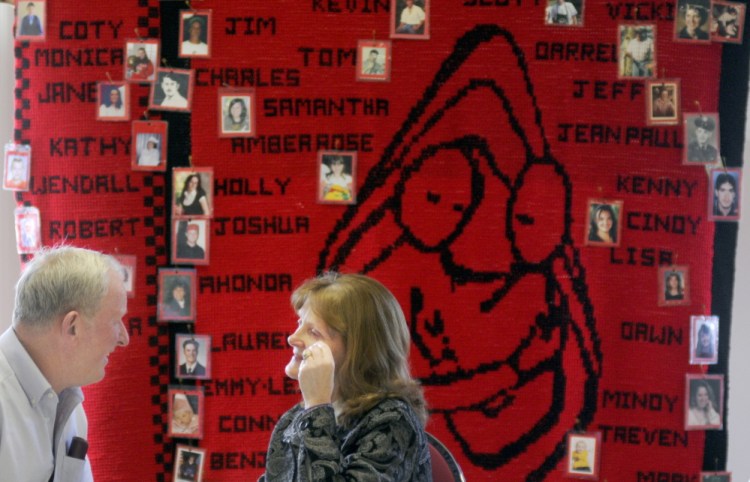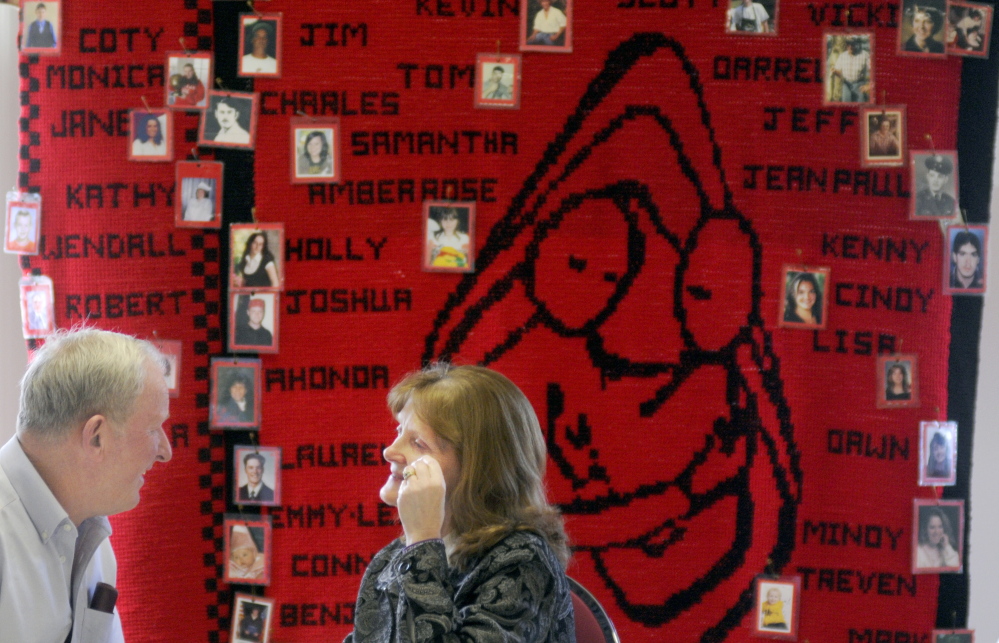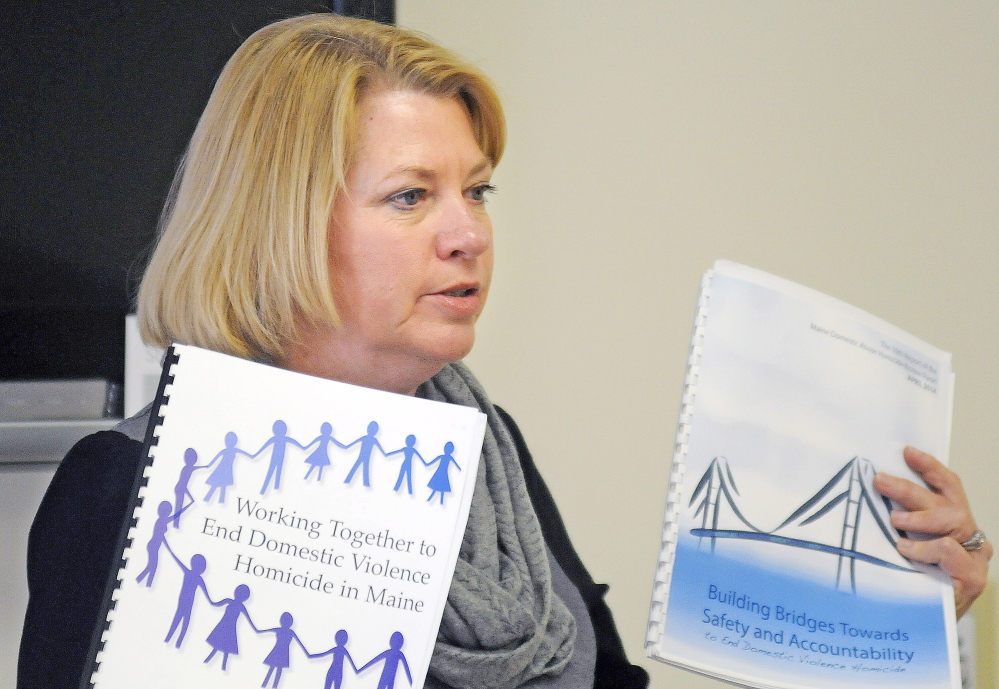AUGUSTA — Parents and other family members of murdered children discussed ways to prevent violence with state Deputy Attorney General Lisa Marchese Sunday, so more families don’t have to live the endless nightmare their lives became after their loved ones were taken from them by murder.
Marchese, noting about half of all homicides in Maine are domestic violence related, said the Maine Domestic Violence Homicide Review Panel she has served as chairwoman of since 2001 meets regularly to review all resolved domestic violence homicide cases with a goal of identifying ways to prevent future similar violent acts.
“There may be some recommendations in (the group’s latest report) that involve your loved ones,” Marchese told about 30 members of the Maine chapter of Parents of Murdered Children who gathered Sunday at the Calumet Club in Augusta. “It’s a small but important way to honor domestic violence victims’ lives by looking at what happened to them. We look at what we can make for changes to our systems. We’re checking ourselves. Obviously somebody didn’t do a good job — somebody died.”
Marchese said the panel sees some things in the crimes it looks into over and over again. She shared recommendations based on what they’ve seen repeatedly. They included these three:
• The most lethal time for any domestic violence victim is when a relationship is ending, so if you know somebody in an abusive relationship, Marchese said to make sure that person has a plan to safely remove herself or himself from the relationship.
• Noting some 70 percent of people who commit domestic violence homicide threaten suicide before they killed the victim, Marchese urged anyone with a family member who threatens suicide to get him or her help.
• She said the panel has seen that firearms are consistently the weapon of choice for people committing domestic violence murders.
“In my personal opinion, until we make progress in this area, we aren’t going to reduce domestic violence homicides,” she said. “Firearms are too easily lethal when somebody has a gun in the closet they can access when they become very angry. The only difference, in many instances, between a battered woman and a dead woman is the presence of a gun.”
Arthur Jette, leader of the Maine chapter of Parents of Murdered Children, whose grandson Treven Cunningham, at 21 months old, was murdered in 1999 in Dexter, said he felt it was safe to say everyone in the room Sunday have had their lives turn into endless nightmares since their loved ones were taken from them violently. He said the group aims to help families of murder victims deal with their intense grief while also seeking justice for their loved ones. Also part of the group’s mission, he said, is preventing more homicides.
He and others have urged actions, including advocating for the creation of a Maine State Police cold case squad to investigate unsolved homicides and missing persons cases. Many attendees signed a petition asking the state Legislature and Gov. Paul LePage to create and fund a squad to focus on such unsolved cases. The petition states, in part, “Maine needs a cold case squad to give families and victims closure and justice. Public safety is an issue with these crimes unsolved.”
He said legislation created an unsolved case squad, but the Legislature’s Appropriations Committee didn’t provide it any funding last year to operate.
“I know from personal experience these detectives and prosecutors are determined to arrest and prosecute those guilty, to help bring justice to those families who have suffered the ultimate insult,” Jette said. “Murder is the ultimate insult. These cases should be given fresh attention, but this can only happen if the (unsolved crimes) unit is funded, so it can be populated. It does have a cost, but what is the value of justice? What is our citizens’ safety worth?”
He said with at least 120 unsolved homicides, suspicious deaths and missing persons cases in Maine, some of the perpetrators of violent crimes are living and walking among us freely.
The presentation was part of the Maine chapter of Parents of Murdered Children’s 11th annual observance of National Crime Victims’ Rights Week, which is April 19 to 25. This year it has a theme of “Engaging Communities. Empowering Victims.”
About 30 people attended the event.
They included Ralph Bagley, of Harmony, whose daughter, Dexter kindergarten teacher Amy Bagley Lake, and her two children, Coty and Monica, were shot and killed by her estranged husband, Steven Lake, who then killed himself in 2011.
Bagley believes the state should institute a system in which those accused of domestic violence are required, if they are released from jail, to wear an electronic monitor attached to their ankles, which can inform authorities of their movements. He said the devices, which are now used in Somerset County, can send out an alert if an accused domestic violence perpetrator leaves or enters a specific area.
“If Steven Lake had one of them on him, my daughter and grandchildren would be alive today,” Bagley said during a luncheon before Sunday’s presentations. “All she needed was some warning.”
Also speaking Sunday was Meg Hatch, who described how the Maine Network of Children’s Advocacy Centers can and does help children who have been sexually abused by working with those children and their non-offending family members to streamline the investigation process and ease and lessen the number of times a child needs to be interviewed about their case.
Carey Nason described how Hope Rising, a St. Andre’s program, plans to soon open a home for women who have been victims of human trafficking. She said the home will take about five people at a time who can stay for up to two years to have space and time to recover and plan what they want to do with their lives. She said the home is in central Maine, but its location isn’t disclosed to protect the confidentiality of the women who will come there.
“None of our children are disposable. We’re all connected somehow,” Jette said. “One vein of crime ripples through the community. Lives could be saved in any one of these veins we’re talking about, whether it is domestic violence, child abuse or human trafficking.”
The national Parents of Murdered Children organization was founded in Ohio in 1978 by Charlotte and Robert Hullinger after their daughter, Lisa, was murdered.
It is intended to offer emotional support and information about surviving the loss of a loved one to murder and “to provide support and assistance to all survivors of homicide victims while working to create a world free of murder,” according to its mission statement.
Keith Edwards — 621-5647
kedwards@centralmaine.com
Twitter: @kedwardskj
Send questions/comments to the editors.






Success. Please wait for the page to reload. If the page does not reload within 5 seconds, please refresh the page.
Enter your email and password to access comments.
Hi, to comment on stories you must . This profile is in addition to your subscription and website login.
Already have a commenting profile? .
Invalid username/password.
Please check your email to confirm and complete your registration.
Only subscribers are eligible to post comments. Please subscribe or login first for digital access. Here’s why.
Use the form below to reset your password. When you've submitted your account email, we will send an email with a reset code.